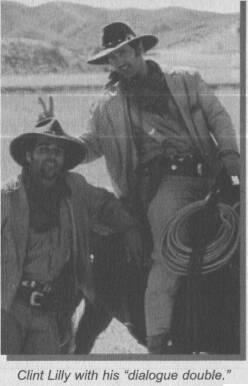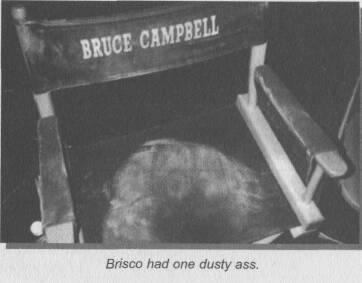If Chins Could Kill: Confessions of a B Movie Actor (41 page)
Read If Chins Could Kill: Confessions of a B Movie Actor Online
Authors: Bruce Campbell
Tags: #Autobiography, #United States, #General, #Biography & Autobiography, #Biography, #Entertainment & Performing Arts - General, #Entertainment & Performing Arts, #Actors, #Performing Arts, #Entertainment & Performing Arts - Actors & Actresses, #1958-, #History & Criticism, #Film & Video, #Bruce, #Motion picture actors and actr, #Film & Video - History & Criticism, #Campbell, #Motion picture actors and actresses - United States, #Film & Video - General, #Motion picture actors and actresses

WARNER
WAS MY
BROTHER
The show was staged on the Warner Bros, back lot, in their remaining vestige of a Western town -- Laramie Street. I didn't care what was left of what, because I was working at the same place that once employed Humphrey Bogart, Bette Davis and Errol Flynn.
Driving on the Warner lot for the first time was a thrill, because I was now a contract player for a film studio -- a notion that I always found very romantic within the world of acting.
An assistant director showed me to my trailer and I dumped my stuff inside.
My own trailer,
I thought.
This is all right.
I looked around and marveled at the comforts of home -- air conditioning, a gas stove, microwave, stereo, TV, dining table, bedroom and even a reclining chair.
The irony there, of course, was that I never had time to enjoy my trailer. Because television is known for speed, I spent almost the entire workday on the set.
Veterans on our crew scoffed at "the feature guys." Their reasoning was simple: TV crews could always move slower like feature crews, but feature crews couldn't necessarily speed up.
As soon as one episode was in the can, another script was right behind it -- if "Brisco in Jalisco" ended on Tuesday, "Bad Luck Betty" began Wednesday morning, complete with a new bad guy and, inevitably, a new love interest. All too often, I'd find myself in the middle of an intimate scene with a guest star and have to ask, "I'm sorry, what was your name again?"
To shoot forty-five minutes of screen time, a feature might take as long as forty-five days -- for
Brisco
we had to do it in seven. There was only one way to achieve this -- by using time-tested TV filming methods.
It didn't mean that the show was a bore to do -- far from it. During the course of twenty-six episodes, my partner, Julius Carry, and I found ourselves in the damnedest predicaments -- from struggling in quicksand and fighting underwater to running from burning buildings and being lashed on a railroad track. There is no question that my stunt double, Clint Lilly, performed the most dangerous stuff, but Julius and I did our fair share.
One particular stunt involved hanging from the third-story window of an old building. The thrill of the shot was to show the danger without the aid of cuts or stunt people. It's amazing how high three stories is, once you actually get up there and look down, but the scariest part was when the video camera came out. Stunt coordinators use them these days to document approval from all integral parties -- that way, if anything went wrong, they wouldn't be liable.
Stunt Coord.: So, Bruce, you understand what's going on here?
Bruce: Yeah, I have to hang from that ledge up there.
Stunt Coord.: You're comfortable with how the gag is laid out?
Bruce: Comfortable? Well, this harness isn't exactly comfortable...
Stunt Coord.: But you're satisfied that all precautions have been taken to insure your safety?
Bruce: Sure, for not having done it before and not knowing what to expect...
I'm happy to say that on
Brisco,
nobody sustained any life-threatening injuries. All stunts were meticulously planned and performed, but there was occasionally what I called the "X" factor.
One scene called for me to be lashed in the middle of the street with the heroine of the week. As the action unfolded, the idea was for us to narrowly escape a stampede of cattle by rolling under the safety of a nearby wagon.
As the actress and I rolled under the wagon, the cattle were supposed to be herded around in a safe manner -- but as the cameras rolled, a logjam formed, and the cattle began to panic. Dozens of them began piling up behind the wagon and it lurched forward -- everyone involved had to think fast. The actress wrapped her body around the front axle of the wagon. I spun around on my back and jammed my boots against the back axle -- I figured if I was going to be trampled, I wanted to see it coming.
Fortunately, with the aid of the wranglers, the herd was soon dispersed and the danger was over. Interestingly, even though the cameraman abandoned his post, his camera stayed straight enough to capture the shot in all of its raw glory, and the footage appears in the episode.
RON WEBBER
Have you ever noticed in classic television Westerns like
Bonanza
or
Gunsmoke
that there are never any horse droppings in sight? That's because of fellows like Ron Webber.
Ron was the craft service guy on
Brisco --
this meant he had to show up before everyone else, fix the coffee and lay out foodstuffs for the crew all day long. It also meant that Ron had the unpleasant task of cleaning up after the horses. The union negotiation that joined the jobs of food preparation and horse manure removal is beyond my comprehension, but that's the way it was.
One of Ron's favorite sayings was, "It may be horse shit to you, but it's bread and butter to me." Such was the nature of this man -- each time he'd scoop up another "road apple," he'd proclaim, "another shingle on my roof!" Chatting with Ron between shots, I learned about his journey through the film business. Eons ago, he found himself painting studio boss Darryl Zanuck's home in the Hollywood hills. Ron did such a fine job that Zanuck moved him over to the Twentieth Century Fox lot, where he continued as a painter.
As the story went, Ron was painting one day, when veteran TV producer Irwin Allen strolled by and caught a glimpse of his bodybuilder physique. Irwin was apparently looking for someone to do a bit in his TV show,
Lost in Space.
Irwin Allen: Hey, buddy, can you pick up a guy over your head?
Ron: Hell yes, I can...
Ron turned to the nearest painter and hoisted him over his head. Irwin Allen hired him on the spot.
"Next thing I know," said Ron, "I'm in the damn show."
I was skeptical of Ron's story, so I asked my archivist pal, Scott Spiegel, to check through his extensive
Lost in Space
video collection and see if there was such an episode. In about two minutes, Scott popped a tape in his machine and sure enough -- there was a younger Ron Webber, deftly hoisting Guy Williams over his head. I'm not sure why, but I was flabbergasted. I came to the
Brisco
set the next day with a copy of the episode in hand and got the crew members to gather around the VCR -- Ron included. When the big moment arrived, Ron just about had a heart attack, and when I told him to keep the copy, he almost cried.
"Gonna show this to the grandkids," he beamed.
It turned out that Ron had had a few brushes with fame. He later worked on the crew of the awful cult classic,
Myra Breckinridge,
with an aging Mae West. One day, Mae called Ron to her trailer and slapped a hand on his thigh -- apparently, she was fond of bodybuilders. Her advances continued, and Ron soon found himself in a dilemma. Not knowing how to avoid a scene, he leaped up and exclaimed, "Ms. West, you're my
favorite
movie star!" and ran out of her trailer.
Ron worked on many films and television shows as a craft service guy. One was the Warren Beatty hit,
Shampoo
.
"I was workin' on that damn
Shampoo,
see, and they was shootin' a scene where Warren was on his motorcycle. He was supposed to come around a corner one way and Jack Warden was in a Mercedes, comin' the other way. Well, ol' Jack, he come around too far, see, and Warren had to lay his bike down to avoid hitting the car. So, there was Warren Beatty, stuck under his motorcycle. Now the crew, they didn't like him too much, but you know what? I says, 'Hey, that ain't right,' and I pulled the darn thing off him. As I was doin' it, he was kickin' so hard to get away from the bike, he kicked the damn tail pipe into my arm and burned me but good."
At this point, Ron rolled up his tight, worn T-shirt revealing a substantial scar.
"Went clean through my navy tattoo."
The next day, Warren Beatty walked past Ron and noticed his arm.
Warren: What happened to your arm?
Ron: Hey, man, you kicked that damn bike into me and burnt my arm.
Warren: What's your name?
Ron: Ron Webber.
Warren: Ron, from now on, you're on all my films.
Ron looked at me with a big smile as he finished this story.
"And you know what? I was..."
On average, Ron worked fourteen-hour days, five days a week -- dutifully, cheerfully, and with no thanks. It bothers me to think that so much of the film business is comprised of hard-working grunts like Ron, but all we ever hear about are the people in front of the camera.
By the time
Brisco
was done, Ron had almost enough union hours to retire. I hope he's home in Oregon right now, swinging in a hammock, telling his grandchildren how he saved Warren Beatty's life.
WAGGING THE DOG
To get a TV show on the air was one thing, but to
keep
it on was a horse of a different color. The impressive thing about the efforts behind
Brisco
was that promotion crossed the typical barriers.




